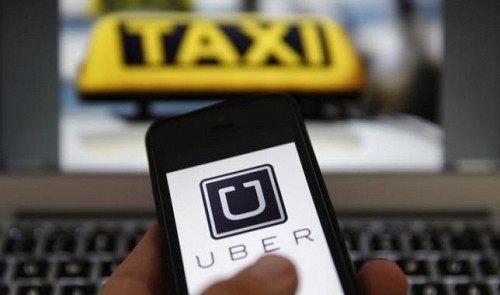Ho Chi Minh City to force cash-rich Uber to pay tax: official

Uber also faces possible fines for the late tax declaration and payment, a representative of the city’s tax department told Tuoi Tre(Youth) newspaper.
The city’s taxman has admitted that it is not easy to oversee Uber for tax issues, as it operates on mobile devices and mostly receives payment via cards.
Uber currently has some 4,000 cars in the southern metropolis, with its business overseen by its parent firm in the Netherlands, Uber B.V., according to the city’s transport department.
The Vietnamese unit of Uber, in the meantime, only registers as a marketing firm for the car-grabbing service.
Uber has therefore only paid taxes for the marketing fees it receives from the Amsterdam-based Uber B.V., the tax official said.
The parent firm pays Uber Vietnam to take care of such tasks as customer management and Q&A, he added.
“The whole transportation activity is managed by Uber in the Netherlands,” he said.
According to the transport department, Uber wires around VND1 billion (US$44,643) worth of profit, which is only about 20 percent of the revenue Uber generates in Ho Chi Minh City, to its parent on a daily basis.
The Ho Chi Minh City taxman has repeatedly sent documents to ask Uber to fulfill their taxpaying duty, but they would never reply, according to the tax official.
The tax department admitted that Ho Chi Minh City is not the first foreign market Uber has entered, so the company has many experience in business organization and tax issues.
“However, we have told Uber that companies have to pay tax for their operations in Vietnam, no matter what kind of business it is,” the official told Tuoi Tre.
The official said the tax department is willing to support Uber to resolve any problems it may have in completing the tax procedures.
“But if the company remains silent, we will take the next step to force them to pay taxes,” he asserted.
“They will also have to pay fees and fines as per the law.”
Even though it is hugely supported by local riders, the Uber operation in Vietnam remains a headache for regulatory bodies as they are confused about how to treat the company in a legal manner.
In Ho Chi Minh City, many departments and agencies have said Uber is going against the law, and they are consulting the transport department on how to report the issue to the municipal administration.
Meanwhile, it is obvious that the city’s taxi sector is not happy to see Uber cars ‘stealing’ their customers.
The Ho Chi Minh City Taxi Association has maintained that Uber is breaching the rule and creating unhealthy competition with local cab operators.
The inspectorate under the city’s transport department has so far booked some 200 Uber cars for not having a license to operate as a taxi, as well as failing to display the required badges and signs.
Uber has been present in Vietnam since June 2014, currently operating only in Hanoi and Ho Chi Minh City. Riders have to book a ride via the Uber app, with the complete fare automatically billed to their credit cards at the end of a ride.
In August 2015, the service began accepting cash as cashless payment is not widely common in the Southeast Asian country.
What the stars mean:
★ Poor ★ ★ Promising ★★★ Good ★★★★ Very good ★★★★★ Exceptional
Themes: Ride-hailing services
Latest News
More News
- First members of Danang International Finance Centre revealed (December 22, 2025 | 17:39)
- Human-centred governance seen as key to AI development (December 19, 2025 | 18:19)
- Top 10 notable events of Vietnam’s industry and trade sector in 2025 (December 19, 2025 | 14:00)
- Tungsten surges to 12-year high as world enters a new 'black gold' race (December 18, 2025 | 17:27)
- Vietnam’s coffee exports set new record despite price pressures (December 18, 2025 | 17:13)
- Garment and textile sector seeks new growth after volatile year (December 18, 2025 | 17:01)
- VinSpeed and Siemens strengthen cooperation for high-speed rail development (December 18, 2025 | 16:53)
- High-tech adoption for TH true MILK (December 18, 2025 | 13:39)
- Takeda supports health resilience amid climate change challenges (December 18, 2025 | 12:39)
- Mondelez Kinh Do - a chapter of purpose-led leadership in Vietnam (December 18, 2025 | 09:44)


















 Mobile Version
Mobile Version